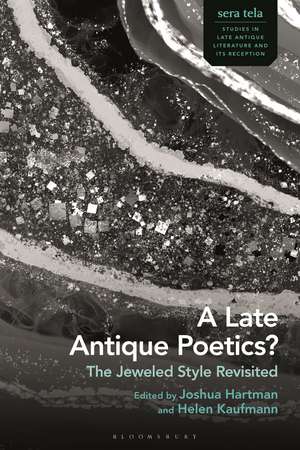A Late Antique Poetics?: The Jeweled Style Revisited: sera tela: Studies in Late Antique Literature and Its Reception
Editat de Joshua Hartman, Helen Kaufmannen Limba Engleză Hardback – 12 iul 2023
Preț: 542.12 lei
Preț vechi: 775.03 lei
-30% Nou
Puncte Express: 813
Preț estimativ în valută:
103.73€ • 108.31$ • 85.85£
103.73€ • 108.31$ • 85.85£
Carte tipărită la comandă
Livrare economică 04-18 aprilie
Preluare comenzi: 021 569.72.76
Specificații
ISBN-13: 9781350346406
ISBN-10: 1350346403
Pagini: 328
Ilustrații: 4 bw illus
Dimensiuni: 156 x 234 x 26 mm
Greutate: 0.64 kg
Editura: Bloomsbury Publishing
Colecția Bloomsbury Academic
Seria sera tela: Studies in Late Antique Literature and Its Reception
Locul publicării:London, United Kingdom
ISBN-10: 1350346403
Pagini: 328
Ilustrații: 4 bw illus
Dimensiuni: 156 x 234 x 26 mm
Greutate: 0.64 kg
Editura: Bloomsbury Publishing
Colecția Bloomsbury Academic
Seria sera tela: Studies in Late Antique Literature and Its Reception
Locul publicării:London, United Kingdom
Caracteristici
By examining the Jeweled Style as a concept, this volume tests its applicability to late antique texts beyond Latin poetry, and considers the influence of other traditions such as Christianity
Notă biografică
Helen Kaufmann is an independent scholar, UK. She has published articles on the poetics of late antique poetry as well as a commentary on Dracontius' Medea (2006). She is particularly interested in the connections between space, place and identity in late Latin poetry.Joshua Hartman is Visiting Assistant Professor of Classics at Bowdoin College, USA. His research focuses on the relationship between literature and memory, especially during late antiquity. He has published articles on Greek and Roman literature, Roman cultural memory and classical reception in Latin America.
Cuprins
List of FiguresList of ContributorsPreface and AcknowledgmentsNotes on Texts and TranslationsAbbreivationsIntroductionJoshua Hartman (Bowdoin College, USA) and Helen Kaufmann (independent scholar)Part I: The Formal Features of the Jeweled Style 1. The Decadent Prehistory of the Jeweled StyleIan Fielding (University of Michigan, Ann Arbor, USA) 2. The Greek Jeweled StyleFotini Hadjittofi (University of Lisbon, Portugal) 3. Gilding the Lily: The Jeweled Style in Prose PanegyricCatherine Ware (University College Cork, Ireland) 4. Learning the Jeweled StyleFrances Foster (University of Cambridge, UK) 5. Quantitative Approaches to Late Latin Poetics: Enumeration and CongeriesJoshua Hartman (Bowdoin College, USA) and Jacob Lavernier (independent scholar) 6. The Jeweled Style and Silver Latin Scholarship Ruth Parkes (University of Wales Trinity Saint David, UK) 7. The Jeweled Style in Early Medieval PoetryCillian O'Hogan (University of Toronto, Canada) 8. Digression, Variety and Unity in (Late) Latin PoetryHelen Kaufmann (independent scholar) Part II: The Jeweled Style and Late Antique Aesthetics 9. Metaphor SquaredChristoph Schubert (University of Erlangen, Germany) 10. An 'Unjeweled' Christian style? A Look at Augustine's ConfessionsJesús Hernández Lobato (University of Salamanca, Spain) 11. The Cento and Scripture: An Early Christian Debate over the Poetics of ExegesisDavid Ungvary (Bard College, USA) 12. Jeweled Sea Storm Descriptions in Zeno of Verona (and Juvencus)Francesco Lubian (University of Padova, Italy) 13. Allusive Clusters and Biblical Configurations in Dracontius, De laudibus dei: A Christian Jeweled Style?Elena Castelnuovo (independent scholar) 14. Vergil's Children: Patterns in Christian Centos and Responses to Vergil's Fourth EclogueScott McGill (Rice University, USA) 15. Architectural Ecphrasis in Venantius Fortunatus: Beyond the Jeweled StyleCarole Newlands (University of Colorado, Boulder, USA) 16. The Jeweled Style in Epigram Bret Mulligan (Haverford College, USA) 17. The Jeweled Style and NeoplatonismAndreas Abele (University of Tübingen, Germany) Epilogue: The Jeweled Style in ContextMichael Roberts (Wesleyan Memorial University, USA)References
Recenzii
When Michael Roberts' The Jeweled Style appeared in 1989, those few of us then studying late ancient literary culture knew that our field would never be the same. Revisiting Roberts' book thirty years later, this volume articulates a sociology of literary late antiquity, while proving the staying power of Roberts' vision and voice, applying his method in ways that will animate, and alter, late ancient literary studies going forward. If a work of extraordinary scholarship can also be a page-turner, this is it-a fascinating, and fabulous, collection.




